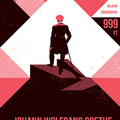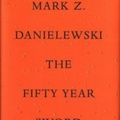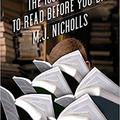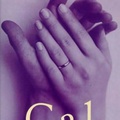Jeffrey Eugenides: The Marriage Plot
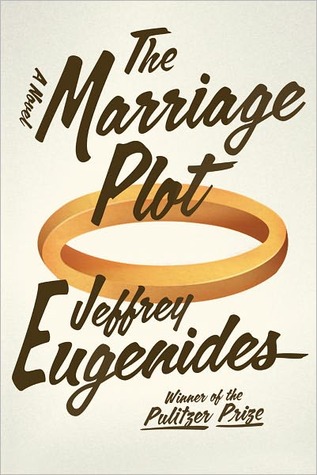
The protagonists of the novel are three fresh college graduates who together constitute a strange love-friendship triangle. The plot revolves around their ever-shifting relationships and their difficulties in starting a new life after college is over (or let’s put it simply: the difficulties of growing up). Each of the three main characters has some specific problems of their own. For the clever and romantically inclined Madeleine the main dilemma is whether she should pursue her studies as a graduate student and immerse herself in the oeuvre of her dearly beloved Victorian authors, or she should abandon literature and a scholarly career altogether and devote herself to her boyfriend, Leonard instead, a brilliant boy who suffers in manic depression and is in constant need of a guardian angel, a savior and a nurse. For Leonard himself the problem is of a more serious and more deeply existential nature. Although he is an unbelievably talented and unique thinker, and he comes up with brilliant ideas during his manic periods, his periods of depression get worse and worse, he ends up deeper and deeper in his private hell, finds it more and more difficult to climb out of it, and makes the lives of those around him more and more hellish as well. For him the question is whether he still has any kind of a chance to live a more or less normal life, or he should accept his illness and succumb to it. The third main character is Mitchell, a young man prone to mysticism. His dilemma is connected to love and a life devoted to religion. Mitchell has felt a great (unrequited) love for Madeleine since the first year of college and after earning his degree he starts out on a long (both real and spiritual) journey to find out whether faith and religion can help him to heal his wounded heart and finally forget the girl.
Throughout the story we find the motif of the „marriage plot” – which was a characteristic feature of several 19th century English novels. In the English literature of that period there are several examples of stories in which the goal is to lead the heroine through many difficulties to the safe haven of marriage. Of course there can be wrong turns and even cul-de-sacs on the road there; misunderstandings and insults may occur; and it’s also possible that the heroine is approached by the wrong man first instead of the perfect one – however, the heroine never marries the wrong man, and all misunderstandings can be easily cleared up finally. In The Marriage Plot, however, the marriage plot doesn’t work anymore, and the main characters of this novel are forced to realize that in the 1980s (or in reality, for that matter) not every love story leads inevitably to a marriage, or even if it does there’s no guarantee that the marriage will be a happy and everlasting one.
This realization doesn’t come easily, of course, and Eugenides takes his time leading the reader through the meandering roads which lead the characters there. Each big section of the novel is written from the perspective of a different character, and we slowly get to know their past, their family backgrounds, the events of their lives in the circa one-year period after graduation, and we also learn how the lived through and assessed their relationships with one another. Showing the events from three separate angles also means that we can see how differently the protagonists interpreted the same events.
Despite the fact, by the way, that the main characters are young people with rather average „young people problems” (most of which are not so very serious – let’s be honest: the kind of love Mitchell feels for Madeleine can usually be survived), The Marriage Plot is an „adult” novel in that it doesn’t simplify what is complicated in the protagonists’ life, and it takes the characters seriously – for me it’s a welcome feeling to read such a book.
By the way, Eugenides writes in the same beautiful and melancholy way as he does in the other novel I’ve read by him so far, The Virgin Suicides. Besides the style being fine and subtle, the book is very „literary” as well – for one thing, the characters are forever reading (and what they read and how they react to their readings often has a great influence over their real lives). And the (post)modernized marriage plot theme of the novel is also highly literary and it constantly makes the characters (and the reader) ask themselves the question: is it possible to live life as if it were a Victorian novel?
I won’t write down the answer. All I want to add is that the last „yes” of the novel, which in a true Victorian novel would probably be the answer to the proposal: „Will you marry me?” is uttered in a very different context and it changes the lives of the characters in an altogether different way than a marriage proposal would. And this final „yes” and the conversation leading up to it is such a powerful and uplifting ending that even if all the previous pages were only mediocre I would still say that you should read this novel for the sake of its last page.
Throughout the story we find the motif of the „marriage plot” – which was a characteristic feature of several 19th century English novels. In the English literature of that period there are several examples of stories in which the goal is to lead the heroine through many difficulties to the safe haven of marriage. Of course there can be wrong turns and even cul-de-sacs on the road there; misunderstandings and insults may occur; and it’s also possible that the heroine is approached by the wrong man first instead of the perfect one – however, the heroine never marries the wrong man, and all misunderstandings can be easily cleared up finally. In The Marriage Plot, however, the marriage plot doesn’t work anymore, and the main characters of this novel are forced to realize that in the 1980s (or in reality, for that matter) not every love story leads inevitably to a marriage, or even if it does there’s no guarantee that the marriage will be a happy and everlasting one.
This realization doesn’t come easily, of course, and Eugenides takes his time leading the reader through the meandering roads which lead the characters there. Each big section of the novel is written from the perspective of a different character, and we slowly get to know their past, their family backgrounds, the events of their lives in the circa one-year period after graduation, and we also learn how the lived through and assessed their relationships with one another. Showing the events from three separate angles also means that we can see how differently the protagonists interpreted the same events.
Despite the fact, by the way, that the main characters are young people with rather average „young people problems” (most of which are not so very serious – let’s be honest: the kind of love Mitchell feels for Madeleine can usually be survived), The Marriage Plot is an „adult” novel in that it doesn’t simplify what is complicated in the protagonists’ life, and it takes the characters seriously – for me it’s a welcome feeling to read such a book.
By the way, Eugenides writes in the same beautiful and melancholy way as he does in the other novel I’ve read by him so far, The Virgin Suicides. Besides the style being fine and subtle, the book is very „literary” as well – for one thing, the characters are forever reading (and what they read and how they react to their readings often has a great influence over their real lives). And the (post)modernized marriage plot theme of the novel is also highly literary and it constantly makes the characters (and the reader) ask themselves the question: is it possible to live life as if it were a Victorian novel?
I won’t write down the answer. All I want to add is that the last „yes” of the novel, which in a true Victorian novel would probably be the answer to the proposal: „Will you marry me?” is uttered in a very different context and it changes the lives of the characters in an altogether different way than a marriage proposal would. And this final „yes” and the conversation leading up to it is such a powerful and uplifting ending that even if all the previous pages were only mediocre I would still say that you should read this novel for the sake of its last page.

